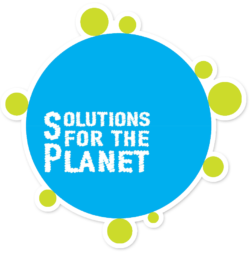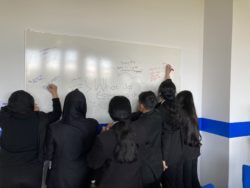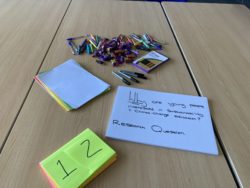Co-designed evaluations for climate crisis education
Background
AMR is often compared to the climate crisis in terms of the need for behavior change. For example, both climate crisis issues and AMR require action now to prevent catastrophe in the future, and in both cases, researchers often need to explain quite a large and multifaceted scientific issue to lay audiences.
I am interested in this from an educational perspective. The climate crisis is an area which has achieved high status in both formal and informal educational offerings. Young people seem engaged with the issue and motivated to act; but why is this?
Approach
I've been exploring the ‘why’ questions around young people’s engagement with the climate crisis by working with young people themselves to evaluate a climate crisis education programme.
 Solutions for the Planet Big Ideas Programme which runs across the country in various locations. Here 11-14 years olds are engaged with climate crisis and sustainability issues through a variety of activities and ask to pick an issue to solve through their ‘Big Idea’. The ideas can be taken forward into a regional and then national competition with an annual final held at the palace of Westminster.
Solutions for the Planet Big Ideas Programme which runs across the country in various locations. Here 11-14 years olds are engaged with climate crisis and sustainability issues through a variety of activities and ask to pick an issue to solve through their ‘Big Idea’. The ideas can be taken forward into a regional and then national competition with an annual final held at the palace of Westminster.
I worked with 18 young people who completed a Big Ideas Day in the 2021-22 school year, and then self-selected to take this idea into the regional competition.

Students from Halifax Academy working at the University of Leeds
The students worked in their school groups to explore their own motivations for staying involved with their Big Idea and sustainability issue
7 of these students then attended a workshop at the University to co-design a series of evaluation questions to capture the views of other young people. Unfortunate due to a COVID-19 case the second school have not yet visited the University to complete their workshop but this is being actively re-arranged.
Findings
Both schools gave loads of insight into the reasons why they engaged with the Solutions for the Planet Big Ideas Programme.
They reflected on their freedom to express themselves, and opportunity to make changes in their lives. Feelings of moral responsibility to change the world and particularly to protect wildlife and wild spaces. They also talked about inequalities and how these can impact our relationships with the environment, wildlife and how sustainable our actions can be.
Summary posters from each in-school session are presented below: School 2 poster
 The visit to the University allowed students to work through a co-design process to develop their own evaluation of the Big Ideas Programme. The outputs of this stage of the project will be shared once the second school has completed the process.
The visit to the University allowed students to work through a co-design process to develop their own evaluation of the Big Ideas Programme. The outputs of this stage of the project will be shared once the second school has completed the process.
